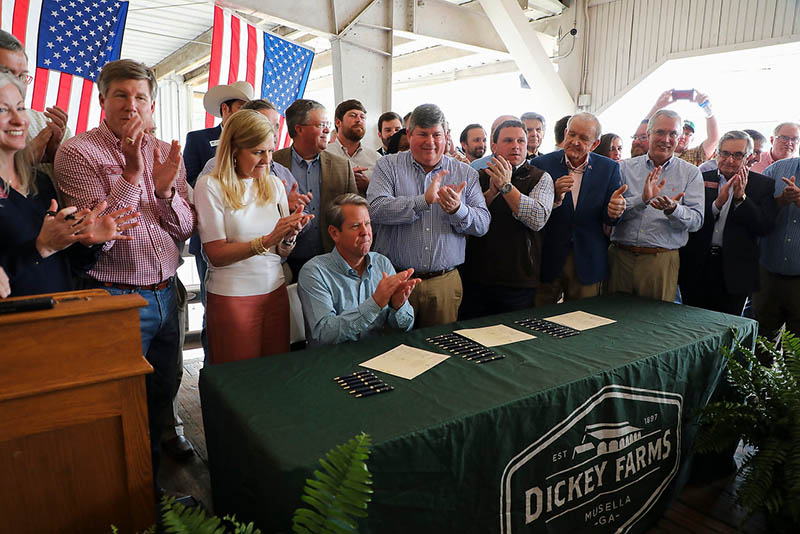By Clint Thompson
The Freedom to Farm bill in Georgia was a legislative win for the state’s specialty crop producers. Just ask Will Bentley, president of the Georgia Agribusiness Council.
“Freedom to Farm was the biggest bill, probably, we’ve had pass in a long time,” said Bentley, whose organization was an avid supporter of the bill.

ONE LESS WORRY
There is enough on farmers’ plates like increased input expenses, labor availability and suppressed market prices due to rising imports that occupy their time, attention and money, according to farmer advocate Chris Butts. Freedom to Farm is just what his growers needed, said Butts, executive vice president of the Georgia Fruit and Vegetable Growers Association.
“There were a lot of agriculture organizations working together and a lot of time and effort went into getting this bill passed,” Butts said. “Our friends at Agribusiness Council and Farm Bureau led the charge. It’s something we supported wholeheartedly because farmers have enough to worry about and enough things out of their control that nuisance lawsuits are the last thing they needed to be worrying about.”
According to Butts, HB 1150, also known as Freedom to Farm, was a necessity since urbanization is encroaching on agriculture, which remains the state’s top industry. “As our demographics change and our neighborhoods and towns start to encroach more and more on farming operations, we could see more potential for that kind of thing. It was great to get the bill passed,” Butts said.
The House and Senate agriculture committees debated the legislation multiple times and made necessary changes to balance the rights of producers and neighbors. HB 1150 protects farming operations after two years of operating as long as they comply with laws, rules, regulations and zoning ordinances.
The legislation can’t prevent a neighbor or citizen from suing the farmer, but it does provide an adequate defense as long as the grower adheres to the rules and environmental laws in Georgia.
WHY IT’S NEEDED
Bentley provided examples of the type of nuisance lawsuits that have occurred in previous years.
“We’ll have people that move out to the country, and they move near a cotton gin,” Bentley said. “They move in the spring when everything is nice and good. The cotton gin is quiet, but then fall comes around and cotton harvest begins. All of a sudden, that gin gets up and running all hours of the day and night trying to gin the cotton in the state. The neighbors don’t like it, and then they want to sue for a nuisance because they think that gin is disrupting their private property. This (legislation) will say that gin is operational and has been there more than two years. Then the gin has the right to continue operating because they’re operating lawfully, properly and not being negligent in their operations.”
“On the fruit and vegetable side, somebody moves out to the country, or somebody already lives out in the country and the farm changes to a specialty crop,” Bentley added. “They’ve got trucks coming in and out. They’ve got laborers coming in and out. There’s a lot more traffic and a lot more sounds, and they’re having to use sprays on crops. They don’t like that they’re using chemicals or using labor. Some activist group convinces them to sue that farmer. That’s what we see more cases of in other parts of the country. Luckily, we’re trying to get ahead of it in Georgia.”
Bentley said that although a law was already in place to protect growers, certain loopholes were discovered and used by lawyers in prior lawsuits. This new legislation should help clean that up.
“There are certain activists that disagree with modern agriculture practices. They’re using every tool in their toolbox to stop it. One of those is filing lawsuits against farmers for various reasons,” Bentley said. “If growers are following the law and following the rules of the state, then they can use Freedom to Farm as a defense in that case.”
MORE WINS
The Georgia Grown Farm to Food Bank Program, also known as SB 396, allows food banks to purchase produce directly from farmers. Hopefully, this will enable Georgia’s specialty crop farmers to avoid dumping or disposing of any crops because of a lack of purchasers. Such dumping and disposing was another unfortunate result of the COVID-19 pandemic in 2020.
“It was really easy to see this during COVID-19, especially when food service initially shut down,” said Butts. “We all saw the pictures of the crops being plowed under, which was ironic since there are areas, especially metro areas, that are underserved and don’t have access to fruits and vegetables. Removing barriers from getting perfectly good fresh fruits and vegetables into the hands of people that need them, that was a no-brainer.”
“We were in full support of SB 396,” Butts added. “I hope that it will open up additional opportunities to connect farmers and food banks, so products don’t go to waste.”
A total of $800,000 was made available through state funding and various grants for the program.
Another important win for farmers was HB 1303, which authorized permanent funding for elementary agriculture education. This will allow additional elementary schools to offer the program. The program helps younger children learn about food and where it originates.









